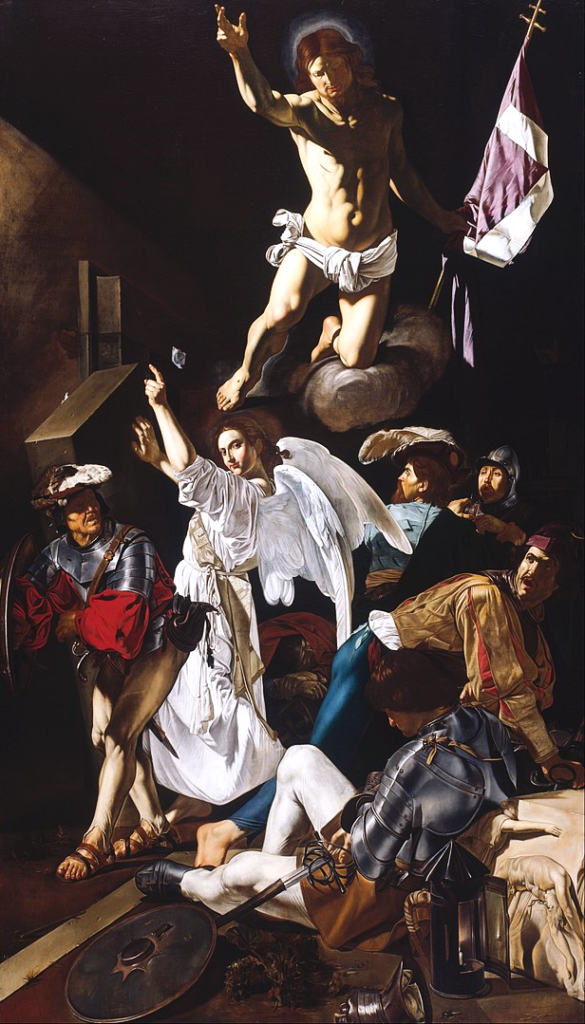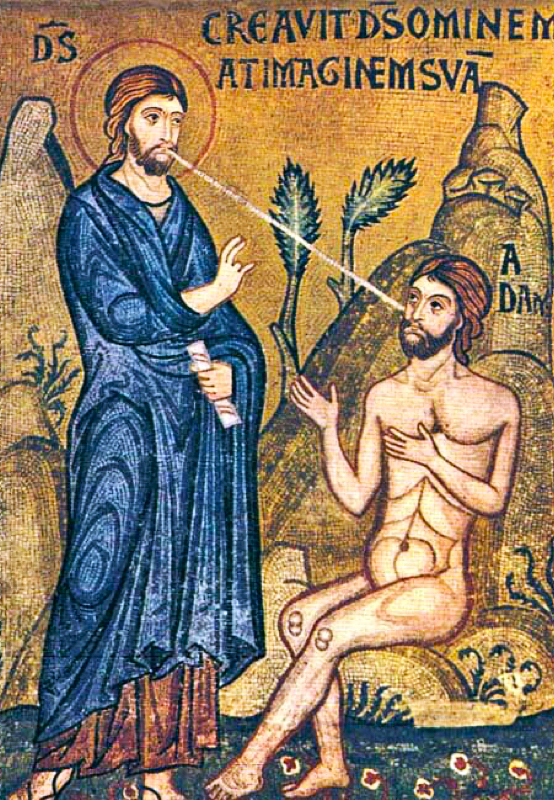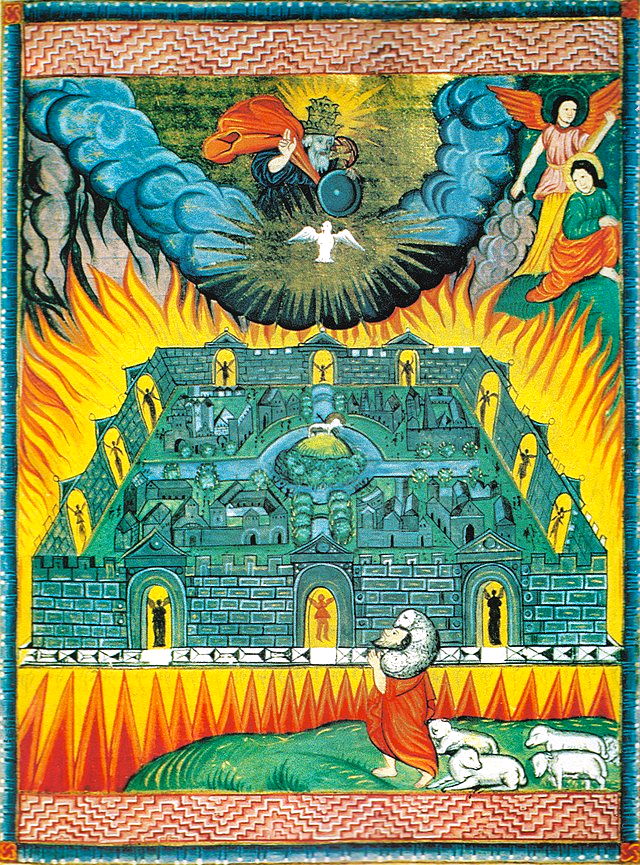Translation of the Epistle for Easter Sunday
Brethren, purge out the old leaven, that you may be a new dough, as you really are without leaven. For Christ, our passover, has been sacrificed. Therefore, let us keep festival, not with the old leaven, nor with the leaven of malice and wickedness, but with the unleavened bread of sincerity and truth.
Continuation of the Holy Gospel According to Saint Mark
At that time, Mary Magdalene, Mary the mother of James, and Salome, brought spices that they might go and anoint Jesus. And very early on the first day of the week, they came to the tomb, when the sun had just risen. And they were saying to one another, “Who will roll the stone back from the entrance of the tomb for us?” And looking up they saw that the stone had been rolled back, for it was very large. But on entering the tomb, they saw a young man sitting at the right side, clothed in a white robe, and they were amazed. He said to them, “Do not be terrified. You are looking for Jesus of Nazareth, who was crucified. He is risen. He is not here. Behold the place where they laid Him. But go and tell His disciples and Peter that He goes before you into Galilee; there you shall see Him as He told you.
The saving Words of the Gospel.
In the Name of the Father, and of the Son, and of the Holy Spirit. Amen.
In Chapter 8 of that most beautiful of Old Testament books, the Canticle of Canticles, it says, Love as strong as death. By its very nature, love requires a certain infinity and eternity for it to be real. Love also requires another to give it to. And this also is better understood when we consider the truth of our Faith of God as a trinity. He is a relationship. And the fact that that is His nature; to be a relationship. There was never a time when there was just a Father, or just a Son, or just the Holy Spirit. They always coexisted in a mutual self-giving and receptivity, one to another. This reveals to us something about everything.
This also explains why G.K. Chesterton would call the God of the Muslims the lonely God of Omar; one who is incapable of relationship, incapable of love. Relationship requires another, and if it’s to be a true loving relationship, it requires infinity. To say I love you, and then to say up until a certain point, or there’s a sell-by-date, or an endpoint, is to empty the word of its meaning. Nonetheless, we live in a passing world surrounded by destruction and death, and the world is careening towards its own demise, and one day, the funeral that you go to will be your own. And so, how do we understand this temporality of life, this insured destruction?
The pagans had varying conceptions of the afterlife. Muslims and Vikings would see it as something of a continuance of the sensate life here. Some pagans only saw nothingness. Others, Greeks and Romans, saw Hades as a place of torment. The Jews were a little all over the place in their understanding of the eternal life. Many of them, though, would agree that it’s living on in another, and this is through memory. But even that is destined for frustration because there will be nobody to remember. And nonetheless, there is something to that – being in the mind in the heart of another – because this began before our creation.
You and I, we were in the Mind and the Heart of Our Lord. He already knew our faces. He knew our names, and in spite of us, He created us. He wanted to. He willed us into existence. He loved us into existence, and because love demands eternity, love demands another. That is our hope.
There’s a word in German called Bindungsangst, fear of commitment, and this is why we see so many young people who are afraid, and not so young, who are afraid to get married. When you commit yourself to another, there’s this joining myself to the trials, the travails, the destiny of this other person, and I don’t control that. And so, there’s often a certain fear in this darkness, this unknowing of what’s to come, and nonetheless, I’m bound to this person. And in hopes of protecting oneself from those unknowns, many choose to not commit themselves to another and then become prisoners of themselves almost in imitation of the lonely God of Omar.
The events of this last week reveal to us the lengths Our Lord is willing to go to prove His fidelity to that initial declaration of love that He made for us. Our First Parents tried to make a mess of it when they made their own declaration of independence from God and wanted to be, as Scripture says, like God. And what does that mean? To be independent, to go it alone, to work things out on my own without this Divine help that I so need. And that is the introduction of sin, death, and destruction that was not part of the original plan. The Book of Wisdom says that God did not will death in the beginning, but because Our Lord is faithful because He is existence itself. He calls Himself that. He says, I am the way, the truth, and the life. He is the life.
Notice when John records those words, he uses the Greek word ζωος (zōos) not βίος (bios) Βίος is another word for life in Greek, but βίος is the life of entities, plants, animals, people that are under this sovereignty of death. Βίος is destined for death. When Our Lord rose up Lazarus, when He rose up the Son of the Widow of Nain, He brought them back to this βίος life and they would die again. But when He calls Himself life, he says, I am ζωος / I am the life principle. The very life principle cannot die. The βίος of the man-God died on the cross but the life principle of the life-giving God cannot die, and in virtue of His sacrifice on the Cross He gives us the life of grace, which Thomas Aquinas calls the inchoatio vitae aeternae; the beginning of eternal life.
And so, the life of grace shows us, reveals to us, that Heaven, eternal life, is not something that comes afterwards, but it’s begun already in our baptism. And our task, our vocation, is to live up to that awesome dignity that Our Lord bestowed upon us when He poured into our souls His own nature, which we participate in through grace. As a result, we don’t only have the gates of Heaven open to us. As a result, we are not only, as if it were little, adopted children of God. We become co-inheritors with Christ of His kingdom. We have a place assigned to us in Heaven. That is our vocation, that’s our dignity, and this is not some ideal world come up with by the philosophers.
It’s actually going to be a physical place and the resurrection that was so laughable by the Greeks when Paul spoke of it in Athens, is actually our destiny, our vocation. We are called to rise in the fullness of our nature, body and soul together, not as a duality, not as just one of those at the expense of the other, both of them together. And so, there’s a certain logic to the resurrection because our nature is to be en-fleshed spirit, body and soul together as a unity, not a dualism, as a unity. The souls in heaven right now are still in an imperfect state, because they don’t have their bodies. They are in perfect happiness, but they’re in, by nature, an imperfect state. And so, the very understanding of our own human nature makes this resurrection of the body that we will participate in even logical and the logical consequence of God’s original declaration of love that he made for us at the beginning of time. And so, Christ’s resurrection is our victory. Alleluia.
In the Name of the Father, the Son, the Holy Spirit. Amen.
— Fr. Ermatinger



